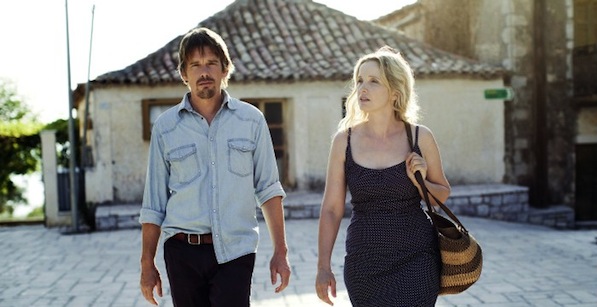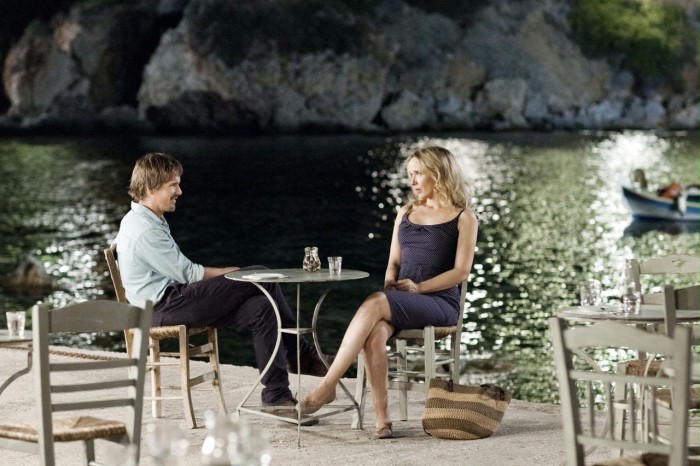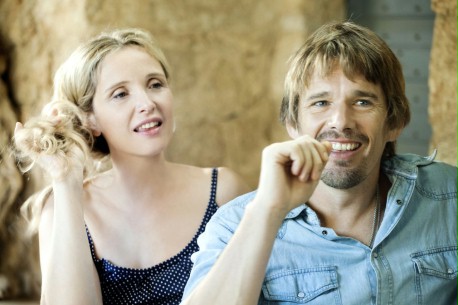Richard Linklater greeted me with a firm handshake and asked where was I from. “Poland,” I replied, “the country where Lech Walesa comes from. He’s our national hero, that guy who you made a sex joke about in this part of the Before trilogy….” The director laughed, “Right, I don’t think there are many of those kind of jokes about him around,” then said, “I’m really proud of this one though. There’s also Gorbachev BJ joke here,” he went on. “And also Havel,” I cordially added. “You basically got all of Eastern Europe.” Several minutes later, after we were done talking about serious stuff, Linklater turned to me, laughing, with a second round of apologies. No regrets, Mr. Director. It was fun!
Linklater’s Before Midnight, the third part of the cultishly followed and critically acclaimed trilogy co-created with Julie Delpy and Ethan Hawke opens this month in the U.S .
Keyframe: Before Midnight is a third part of an ongoing filmmaking process. You’ve said you haven’t planned any of the sequels. How do you know it was time to make it happen again?
Richard Linklater: No, we don’t plan it. It’s an accidental trilogy, really. It’s happened twice now, every time in a similar timespan. We go five to six years [from the previous part], and there may be a joke about it when we are together, like, ‘Oh, and there will be a sequel!’ with such or such punchline that is funny or silly… Then [after some time] I myself or Ethan or Julie are like, “…maybe, you know, this was not such a bad idea…” We’ve lived those extra years, and so have the characters we’ve created, Celine and Jesse. They start to rear their heads and talk about this new stage in their lives and that maybe there’s something to express about being in a different point in your life. So it’s gonna evolve as a life project, I guess.
Threesome for life? ‘Vienna was not just a flame in a bottle. It was and still is a very special thing for all of us,’ says Richard Linklater on his relationships with Julie Delpy and Ethan Hawke.
Keyframe: So it’s not just you who makes the decisions. It seems like Celine and Jesse also have a say in the process.
Linklater: It kind of feels this way. And for us it’s a good repository for any feelings about the film. As an artist I think everything that means something has a place. As a writer, or a filmmaker, I can say, ‘Oh, that idea is better over here, and this one over there.’ Jesse and Celine represent something to all three of us. It’s exciting to feel they’re alive again. But it’s been the same way these last two times. The big leap was doing the second one. That was the one that made no sense, the first sequel, Before Sunset.
Keyframe: Have the dynamics of your collaboration changed over those years?
Linklater: I have almost a decade on Ethan and Julie, so even though we have kids of similar ages, in these films I’m looking back a bit. That’s always been an interesting dynamic to me, particularly in the first film. I was in my early thirties, they were twenty-three. I’d be going to this time as I remembered it, but they were living it, so we were catching them in their moment. That’s still similar and I like that.
Keyframe: So, who is the captain of the Before ship?
Linklater: First I was, but now less and less. We got to a point where we are all truly co-captains. Twenty years ago I wrote the script for Before Sunrise, then met Ethan and Julie through traditional casting. In my two previous films gender was an important issue and I really wanted a strong female character, female voice. I found a great partner in Julie. Also the way Ethan thinks is very pro-Celine. Ethan writes quite a bit of her dialogue; so do I. Now we all write the dialogue together and the characters have bits and pieces of all of us. I see myself in both of them. In the first script their job was to build up their own characters, but the more we do this, I think, the last two films they’ve contributed themselves to each others’ characters.
Keyframe: Talking with Ethan and Julie I found out that, to my surprise, you are not up for improvisation, but stick meticulously to the script. It’s not what I thought after watching all the Before films.
Linklater: That’s the goal: to make it seems very natural. Whenever the public feels like it, it’s a compliment. But it’s really hard to achieve and takes a lot of our work, it this case, Julie and Ethan’s. Most films are not asking of actors what this film is. In the three movies I don’t think there’s one line that hasn’t been thought about and scripted, or at least structured by the three of us. It’s all meticulously structured and planned.
Keyframe: It must be very difficult at times. For example, there is a very long scene in Before Midnight, full of complex dialogue, shot in one take in a moving car…
Linklater: Right? This one is over thirteen minutes long! The real performance in it is the sleeping twins in the back seat. They’re not really asleep, that’s good acting. We shot the scene in two days. I shot some traditional coverage on the first and then on the second day I took two cameras an we took two mastershots. I think there were three takes and the last one ended up in the film.
Keyframe: Before saga started as a tiny indie initiative before it became an international hit. Has it turned into a profitable enterprise over the years?
Linklater: Well, we’ve managed to do a trilogy, so it’s obviously not that bad. This one was not fully easy to fund… Jokingly, we call the second one the ‘lowest grossing film to ever spawn a sequel.’ And now we are one of the lowest-grossing films to ever be a franchise. It’s not a box-office thing.
Keyframe: More of a cult thing.
Linklater: Right. Most people watch it on DVDs. Actually, most people don’t watch it. It’s an indie little thing. Most of the places I go, people have never heard of it. But at the same time in the United States…well, middle America doesn’t know anything about anything. I don’t think they watch one film a year on average.
Keyframe: Are you aware that for some people your films are like a relationship bible?
Linklater: I’m getting those sweet little signs of it: people are getting married and they are asking to sign a film poster with their names, because they watched those films together when they met… But the characters feel so personal to us that I’m not fully aware of it.
Keyframe: Woody Allen now shoots where there’s a willing investor; I hope it’s not the case with you? Why have you chosen Vienna, Paris and Greece as your scenery?
Linklater: No, in none of those cases was it financial. The city is always the third character. Scenery changes and so do the characters. The choices were usually influenced by hospitality. Except for Paris: it is not a hospitable place to make a movie, not at all. It’s a great city, but they don’t help you, quite the opposite. But that is where Celine lived at the time and where Jesse might have been doing the book reading, so it had to be. With Greece I just liked the locations, the vibe and the people. I found a couple of locations that fit perfectly; especially the house where the action takes place at the beginning. That was a real writer’s house, it belonged to Patrick Leigh Fermor [best known as Paddy Fermor, a british author, scholar and soldier, regarded as ‘Britain’s greatest living travel writer’], who passed away about a year before. My producer had access to the property, I had some connections there, some filmmaker friends… Once we’ve decided our protagonists were on holiday, it made sense that Jesse was in this writer’s retreat thing at the beautiful coast. There is also something about the ancientness of Greece that made me love it. [Making the film] I was trying to avoid the postcard, Mamma Mia! image of Greece. We’re joking that next thing coming is Celine buying peanut butter in Chicago.
Keyframe: But seriously, can you imagine the issues your characters might be dealing with in the next chapter?
Linklater: It all started after the second part: we’ve been asked about the next part at every possible interview ever since. Now, that we’ve made the third film, everybody’s convinced the next part is just a matter of time. But I guarantee you, we have no idea… We can do the math: they’ll be fifty. It’d probably be the empty nest theme… I had this idea: we should do a film two years from now, make them eighty, hire people from Cloud Atlas to help.
Keyframe: Julie Delpy jokingly hinted at a similar option when at the press conference in Berlin she suggested the last part of Before will resemble Haneke’s Amour, so the characters will be fifty. Have you changed a lot from forty to fifty?
Linklater: That’s always the question: do we change much? I’m obsessed with this. On the one hand not much is happening. I’m stuck with myself and with only how much I can do in this world. But inside, I’ve changed a lot, with experience and time. It’s a very interesting theme and the film poses this question about Jesse and Celine. Their life circumstances have changed but have they? Where are they now? That’s one of those eternal, mystery-type questions that we all have to ask ourselves. Out of all our relationships in this world, those with our friends, family, loved ones, the most enduring is this to our previous selves. What is your relation with your twenty-year-old self? Your eight-year-old self? Your thirty-year-old self? This something we have to keep on asking ourselves all the time. What’s different? How have I changed? What is changing me? Am I happy…? That is fundamental.
Keyframe: Your films are about deep, difficult but awesomely alive love. It seems like what people want, but can’t have. Divorce has been a hot social issue for decades now… Is showing how social landscapes change also a part of your mission as a director?
Linklater: It is to a certain extent. It’s not like TV and reality shows caused the deterioration of morality and lack of religion. It’s just that worldwide the modern world has allowed people not to be partners for life, regardless of religion or any of that. That’s a fairly modern phenomenon that I’ve certainly experienced in my own life. My parents were in the front of the divorce wave. It happened when I was a kid and was rather rare back then, at least in the part of the country where I lived in; but then it became a regular thing. Which I think is closer to human nature.
Keyframe: Yet some people, including your characters, want love that lasts a lifetime.
Linklater: I find it beautiful, but you also know what goes behind that. The element is how much you can stand a compromise and what kind of accommodation you can have with your partner, whether that’s a friend or a business partner; life is this ground war of negotiations of space, accommodation and time. Most of the times you see couples that compromise their life away and are not happy. They are dead. I feel sorry for them. I very much admire a longterm relationship where the couple is still alive and vibrant. When I see such people I think to myself, ‘They know something, there’s some code they’ve cracked, some secret.’
Keyframe: From the outside this part is the most difficult, sad one, with all the conflict going on. But the common opinion is that it’s also the most relatable. Why do you think that is?
Linklater: I think that’s great. This time Jesse and Celine are very much grounded in reality, interacting with people. I’m not saying they have cracked the code of the happy longterm relationship… but I liked the idea of seeing a little bit of will in their attitudes. They do have the ability—we all do!—to work through. If you really care, you can make it work. If it matters of course—because sometimes there is this point where it doesn’t anymore and you just move on, you quit. Ethan and Julie are very strong. The films seem effortless and I’m glad people think that. But they’re not, believe me. The onscreen relationship is in a sense a metaphor for our working relationship, too. In films you work with people and then you move on. But when we met some time after the first film we knew that Vienna was not just a flame in a bottle. It was and still is a very special thing for all of us.






